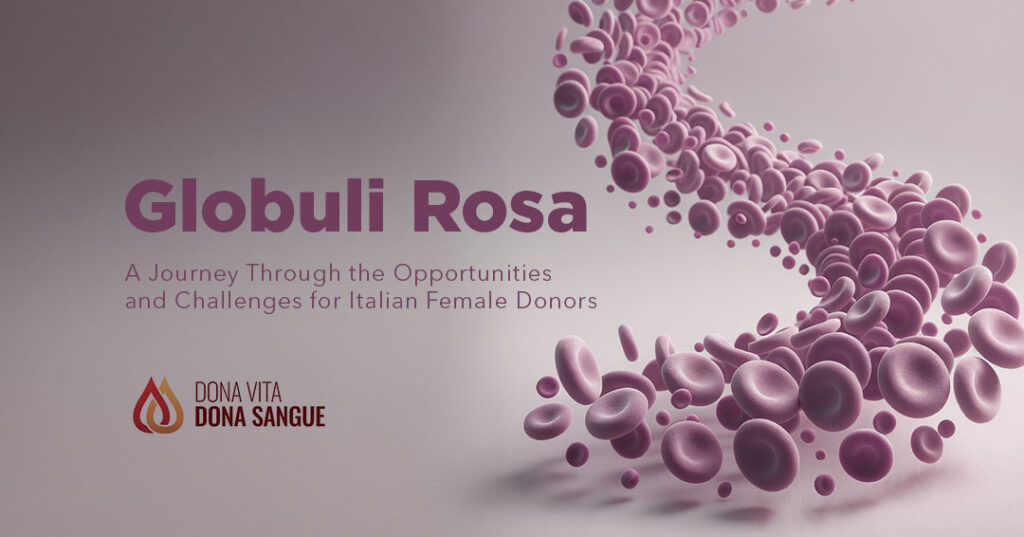On June 24th blood donation turns pink. As part of the “Dona vita, dona sangue” campaign, promoted by the Ministry of Health in collaboration with the National Blood Center and the main donor associations (AVIS, Italian Red Cross, FIDAS, FRATRES and DonatoriNati), the monitoring system called “Globuli Rosa”, started its journey through the possibilities and obstacles of Italian female donors. Globuli Rosa aims to investigate the reasons why women in Italy, particularly those over 30, donate less than in other countries and to find solutions in this regard.
When it comes to blood donation, it can be seen that Italiam women represent only 33.7% of the total donors. A figure that goes against the trend of several European countries, where there is a prevalence of female donors. Donating blood and plasma is actually a simple but fundamental gesture if you consider that in Italy approximately every 11 seconds someone needs blood and that transfusion is a life-saving practice in many cases.
The project, anticipated last June 11th, at the event dedicated to the “Dona vita, dona sangue” campaign in the presence of the Minister of Health Orazio Schillaci, sees as its first phase a survey and some focus groups which aim to stimulate sincere opinions and collect experiences that can shed light on this important topic and which will result in an ad hoc report and communication activity.
In particular, the survey, launched on the official channels of the National Blood Center and the Ministry of Health via the donailsangue.salute.gov.it portal, will examine what drove women to become donors or, if not, the reasons why they did not have ever donated; what would convince them to donate or, if they had stopped, what would push them to do so again.
At the same time, in collaboration with the Doxa Research Institute, some focus groups will be activated. These groups are representative samples of not-donor or former donor women (30-45 years and 46-55 years) on Italian territory. The interviews will aim to explore motivations, beliefs, influential factors who led them to their choice. This research will aim to stimulate reflection on oneself and on even the most latent and profound impeding factors that distance one from donation.
“The ‘Globuli Rosa’ observatory – comments the director of the National Blood Centre, Vincenzo De Angelis – is, among the many initiatives implemented in collaboration with the Ministry of Health, the one which aims to shed light on an unresolved question of our blood system. In the younger age group, male and female donors have more or less the same numbers. The older you get, the more the gap widens. The data is particular and goes against the trend of other European countries, such as France, Belgium and Portugal. Whether it is incorrect information or a problem inherent in our social system, there is something that pushes women to stop donating. With Globuli Rosa we want to give a voice to donors, to those who no longer donate, to those who would like to do so and are unable to. Because only by listening to their voices we will be able to start a process of change that takes into account needs that have probably been ignored so far.”
The “Dona vita, dona sangue” campaign
Last 11 June the Ministry of Health – in collaboration with the National Blood Center and the main donor associations (AVIS, Italian Red Cross, FIDAS, FRATRES and DonatoriNati) – launched for the second year the “Dona vita, dona sangue” campaign, a communication action aimed at promoting the culture of blood and plasma donation. The campaign, which featured the actress Carolina Crescentini and the former rugby star and television host Martín Castrogiovanni as testimonials, had its first important result in 2023, when no blood shortages were recorded for the entire summer period.
Blood and plasma donation
Blood and plasma donation is open to all citizens who have a valid identity card.
Physical requirements
In order to donate the following are required:
- age between 18 and 65 (for the first donation 60 years old max, periodic donors can donate up to 70, subject to the consent of the selecting doctor)
- minimum body weight of 50 kilograms
- a good health.
For information and to find the nearest collection unit, consult:
donailsangue.salute.gov.it

